-
Rendez-Vous with French Cinema at Lincoln Center 2015
From the Film Society of Lincoln Center.

. . . . March 6 – 15, 2015
Rendez-Vous with French
Cinema 2015
March 6 – 15
To provide feedback to reviews and get day-to-day updates on screenings go to the Rendez-Vous Forums thread HERE.
Links to the reviews:
3 Hearts (Opening Night Selection) (Benoît Jacquot 2014)
Reality (Closing Night Selection) (Quentin Dupieux 2014)
40-Love/Terre battue (Stéphane Demoustier 2014)
Breathe/Respire (Mélanie Laurent 2014)
The Connection/La French (Cédric Jimenez 2014)
Eat Your Bones/Mange tes morts (Jean-Charles Hue 2014)
Fidelio, Alice's Odyssey/Fidelio, l'odysée d'Alice (Lucie Borleteau 2014)
Gaby Baby Doll (Sophie Letourneur 2014)
Hippocrates/Hippocrate (Thomas Lilti 2014)
In the Courtyard/Dans la court (Pierre Salvadori 2014)
In the Name of My Daughter/L'homme qu'on aimait trop (André Téchiné 2014)
Love at First Flight/Les combattants (Thomas Cailley 2014)
May Allah Bless France!/Qu'Allah bénisse la France! (Abd Al Malik 2014)
Métamorphoses (Christophe Honoré 2014)
My Friend Victoria/Mon amie Victoria (Jean-Paul Civeyrac 2014)
Next Time I'll Aim for the Heart/La prochaine fois je viserai le coeur (Cédric Anger 2014)
Party Girl (Marie Amachoukeli-Barsacq, Claire Burger & Samuel Theis 2014)
Portrait of an Artist/Le dos rouge (Antoine Barraud 2015)
SK1/L'Affaire SK1 (Frédéric Tellier 2014)
Stubborn/Une histoire américaine (Armel Hostiou 2015
Wild Life/Vie suavage (Cédric Kahn 2014)
Young Tiger/Bébé tigre (Cyprien Vial 2014)
SHORTS PROGRAM
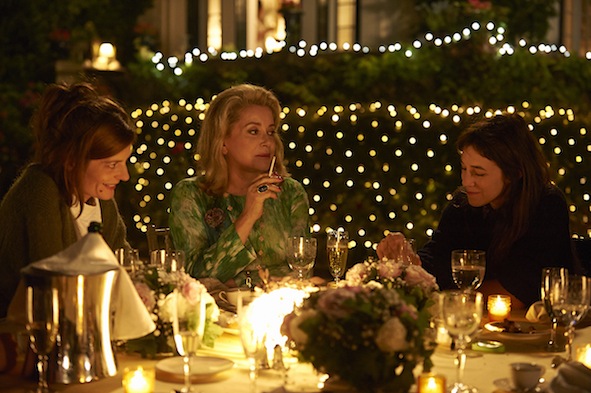
Rendez-Vous opening night film: Chiara Mastroianni, Catherine Deneuve, and Charlotte Gainsbourg in Benoît Jacquot's 3 Hearts
22 Premieres Set for 20th Rendez-Vous with French Cinema in March
The U.S. premiere of Benoît Jacquot's 3 Hearts will open the 20th anniversary edition of the Rendez-Vous with French Cinema festival. A showcase of contemporary French cinema, this year's lineup includes 22 features and four short films making their New York, U.S., or North American premieres. Director Quentin Dupieux will close out the festival with his latest film, Reality, a comedy shot in L.A. Organized by the Film Society of Lincoln Center and Unifrance Films, this year's Rendez-Vous will take place March 6-15, 2015.
Starring Charlotte Gainsbourg, Chiara Mastroianni, and Catherine Deneuve, 3 Hearts is touching and tense drama about destiny, connections, and passion surrounding a classic love triangle between Benoît Poelvoorde (Man Bites Dog), Charlotte Gainsbourg (Nymphomaniac), and Mastroianni (Persepolis).
Rubber director Quentin Dupieux's Reality stars French veteran Alain Chabat with Eric Wareheim and Jon Heder (Napoleon Dynamite), and features Philip Glass’s Music with Changing Parts. The film weaves together the journeys of an 8-year-old girl who finds a mysterious VHS tape, a failed filmmaker shooting his first horror movie, and a culinary TV host who loses his self-confidence because of an imaginary skin disease.
New and veteran filmmakers will share the spotlight over the 10-day series. Stéphane Demoustier's debut feature 40-Love stars Olivier Gourmet as a department store sales manager who loses his job as well as his wife (Valeria Bruni Tedeschi). But hope is found through his 11-year-old son who shows promise as a tennis pro. Actress Lucie Borleteau makes her feature directing debut with Fidelio, Alice’s Odyssey, starring Greek actress Lucie Borleteau, who won Best Actress at last year's Locarno Film Festival. Celebrated rapper and spoken word artist Abd Al Malik makes his directorial debut with May Allah Bless France!, a candid account of his early life and artistic awakening, shot in black and white. The feature won the FIPRESCI Discovery Prize at the 2014 Toronto International Film Festival. And Frédéric Tellier joins Rendez-Vous with his suspenseful feature debut SK1, starring frequent Dardennes collaborator Olivier Gourmet, Christa Théret (star of Rendez-Vous 2013’s Renoir), Raphaël Personnaz (star of Rendez-Vous 2014’s The French Minister), and four-time César winner Nathalie Baye.
"Some trends we see among current young filmmakers relate to coming-of-age and social issues," observed Almozini. "This is particularly true for films like 40-Love and May Allah Bless France!, which looks at the [controversies] surrounding immigration and other facets of society."
Internationally acclaimed actress Mélanie Laurent (Inglourious Basterds) follows up her 2011 feature directorial debut, The Adopted, with a story about high-school angst and obsession in Breathe. Academy Award winner Jean Dujardin (The Artist) stars in The Connection, a gripping thriller from the files of the same criminal ring that inspired William Friedkin’s classic The French Connection and includes an all-star French cast. And renowned director Bertrand Bonello (Saint Laurent, and the subject of a retrospective at the Film Society last May) stars as "Bertrand," a filmmaker approaching his next project with a peculiar obsession.
Filmmakers and talent who will be in attendance at this year’s festival include Cédric Anger, Nathalie Baye, Lucie Borleteau, Thomas Cailley, Guillaume Canet, Stéphane Demoustier, Charlotte Gainsbourg, Christophe Honoré, Benoît Jacquot, Cédric Jimenez, Cédric Kahn, Ariane Labed, Melanie Laurent, Abd Al Malik, Chiara Mastroianni, Celine Sallette, Frederic Tellier, and more to be confirmed at a later date.
"We are thrilled to be celebrating the 20th Anniversary of Rendez-Vous with French Cinema with our partners at Unifrance Films. We have an exciting lineup including a focus on New French Noirs, in the great tradition of Jean-Pierre Melville and Claude Chabrol, with Cédric Jimenez’s The Connection, Cédric Anger’s Next Time I’ll Aim for the Heart, and Frédéric Tellier’s SK1 that will prove the vitality of the genre," said Almozini. "Once again, the festival will also introduce audiences to new talent, discoveries from behind and in front of the camera, with many first-time films, including Thomas Cailley’s Love at First Fight, Marie Amachoukeli-Barsacq, Claire Burger, and Samuel Theis’s Party Girl, Thomas Lilti’s Hippocrates, and Lucie Borleteau’s Fidelio, Alice’s Odyssey, which all prove the vitality and the creativity coming from France."
In addition to 3 Hearts, French screen icon Catherine Deneuve stars in two other films—In the Courtyard and In the Name of My Daughter. In the former she plays a retired woman who befriends a new and eccentric caretaker in her apartment building. And the latter is a psychological drama set in mid-70s Nice.
Festival award winners are ubiquitous in this year's Rendez-Vous roster. including the gritty Party Girl, which took home two awards at Cannes (including the Camera d’Or), and was a standout in Un Certain Regard; the debut feature from Thomas Cailley, Love at First Fight, was a triple winner at last year’s Cannes, where it played in the Directors’ Fortnight; and Wild Life, directed by Cédric Kahn (Red Lights), received a special jury prize at the San Sebastian International Film Festival.

Quentin Dupieux's Reality
For the fourth year, the festival is collaborating with Emerging Pictures on select titles. The films will screen in venues across the country contemporaneously with their showings at Lincoln Center via Emerging’s network of digital theaters. Q&A’s from the Film Society venues will be broadcast live to many of those locations. The selected titles include Eat Your Bones, Gaby Baby Doll, Hippocrates, In the Courtyard, Love at First Sight, Portrait of the Artist, and Stubborn.
Added Almozini: "We are proud to have several seasoned directors coming back to introduce their latest oeuvres, Benoît Jacquot, of course, who is opening the festivities, and André Téchiné, Christophe Honoré, Cédric Kahn, Jean-Paul Civeyrac, Quentin Dupieux, and more. Get ready for an amazing 10 days of thrilling French cinema."
Screenings for the 20th Rendez-Vous with French Cinema will take place at the Film Society, IFC Center, and BAMcinématek.
[Members of the Film Society of Lincoln Center, IFC Center, and BAM Cinema Club will all receive an advance on-sale for their respective venues only, beginning Thursday, February 12. General Public tickets for the 2015 Rendez-Vous series at all three locations will go on sale Thursday, February 19. Tickets are available online for each participating venue at filmlinc.com, ifccenter.com, and BAM.org/BAMcinematek, respectively, as well as directly from the box offices. For more information, please visit rendezvouswithfrenchcinema.com. Tickets for Opening Night at Alice Tully Hall will be available online at filmlinc.com.]
Films and descriptions follow:
3 Hearts / 3 Coeurs (Opening Night)
Benoît Jacquot, France/Germany/Belgium, 2014, DCP, 106m
French with English subtitles
While traveling through a small provincial town, reserved and melancholic Parisian Marc (Benoît Poelvoorde, Man Bites Dog) meets by chance Sylvie (Charlotte Gainsbourg), a mysterious and beautiful stranger. The two spend a magical night together and fall madly in love. Without exchanging names or information, they agree to meet by a fountain in Paris, à la An Affair to Remember—but as in that classic tearjerker, fate conspires against them. Thinking herself jilted, Sylvie returns to her past life, whereupon Marc meets and woos Sophie (Chiara Mastroianni)—blissfully unaware that she’s Sylvie’s sister. Benoît Jacquot, whose Farewell, My Queen was a highlight of Rendez-Vous 2012, directs this romantic and tragic roundelay, co-starring the luminous Catherine Deneuve (Mastroianni’s mother on-screen and off-). A Cohen Media Group release. U.S. Premiere. [French release 3 September 2014, AlloCiné press rating 3.6.] 3 HEARTS is scheduled to open in New York on Friday, March 13 (at Lincoln Plaza) followed by a national roll-out.
Reality / Réalité (Closing Night)
Quentin Dupieux, France/Belgium, 2014, DCP, 102m
French and English with English subtitles
Quentin Dupieux, the architect of Rubber (which, in case you missed it, was about a sentient, murderous tire), lets his imagination take flight again, resulting in a multi-threaded Lynchian house of mirrors. The only “reality” on view here is a little girl by that name (Kyla Kenedy) who finds a VHS tape inside the carcass of a boar her father is planning to stuff. Meanwhile, the cameraman (Alain Chabat) of a show hosted by a man in a bear suit (Jon Heder, Napoleon Dynamite himself) needs to record the perfect scream for his pet project, a film about killer TVs. You won’t want to miss this unique and hilarious reverie—much more than the sum of its quirks—featuring Philip Glass’s Music with Changing Parts, a perfect sonic analog to Dupieux’s ineffable vision. An IFC Midnight release. [French release 18 February 2015.]
40-Love / Terre battue
Stéphane Demoustier, France/Belgium, 2014, DCP, 95m
French with English subtitles
When Jérôme (Olivier Gourmet), a fiftyish department-store sales manager, loses his job, and his wife Laura (Valeria Bruni Tedeschi) leaves him for another man, all he has left are his pipe dreams and his son Ugo (first-time actor Charles Mérienne). Though only 11 years old, Ugo already shows great promise as a tennis pro, with a trainer eager to recruit him. Jerome cares for Ugo’s auspicious career only grudgingly until a startling development forces him to rethink his priorities. Playing another of his harried "ordinary men," Gourmet brings trademark authenticity to a role that (like the film’s tennis-entendre English title) skirts both silliness and melancholy. Thanks to his efforts and the preternaturally confident young Mérienne, this first feature by Stéphane Demoustier clears the net on every serve. [French release 17 December 2014, AlloCiné press rating 3.1.]

Mélanie Laurent's Breathe
Breathe / Respire
Mélanie Laurent, 2014, France, DCP, 91m
French with English subtitles
Internationally acclaimed actress Mélanie Laurent (Inglourious Basterds) follows up her 2011 feature directorial debut, The Adopted, with a perceptive account of high-school angst and obsession. Shy 17-year-old Charlie (Joséphine Japy) becomes fast friends with Sarah (Lou de Laâge), a new arrival in their school. The outgoing Sarah coaxes Charlie out of her shell and becomes a fixture in her home, but when the two go on holiday together their relationship turns sour. Laurent trusts her gifted young stars with challenging long takes and they reward her faith in abundance. Featuring César winner Isabelle Carré (Beautiful Memories) as Charlie’s dysfunctional mother, Breathe echoes Bue Is the Warmest Color in broad strokes but paints its own striking portrait of youthful ardor and codependency. [French 12 November 2014, AlloCiné press rating 3.5.]
The Connection / La French
Cédric Jimenez, France, 2014, DCP, 135m
French with English subtitles
Academy Award winner Jean Dujardin (The Artist) plays radically against type in this gripping thriller from the files of the same criminal ring that inspired William Friedkin’s classic The French Connection. Dujardin is Pierre Michel, a Marseilles magistrate who dedicates himself to apprehending fearsome heroin czar Gaetano Zampa (Gilles Lellouche, Little White Lies). As in the policiers by Jean-Pierre Melville that it evokes, the principled antagonists of The Connection are two sides of a coin, more like one another than the rats in their respective organizations. Director Cédric Jimenez uses late-70s music and fashion to resurrect the disco-age backdrop against which their vendetta played out. Though highlighted by Dujardin’s Delon-esque turn, the all-star French cast includes Benoît Magimel (Isabelle Huppert’s pupil/pursuer in The Piano Teacher), and the luminous Céline Sallette (House of Pleasures) as Pierre Michel’s wife. A Drafthouse Films release. U.S. Premiere. [French release 3 December 2014, AlloCiné press rating 3.7.]
Eat Your Bones / Mange tes morts
Jean-Charles Hue, France, 2014, DCP, 94m
French with English subtitles
After his documentary/fiction hybrid debut, The Lord’s Ride, which portrayed the gypsy communities of northern France, director Jean-Charles Hue reunited several of that film’s nonprofessional stars to tell the story of another Romani family. Eighteen-year-old Jason (Jason François), on the verge of baptism, finds his values tested when half-brother Fred (Frédéric Dorkel) returns from a 15-year prison stint anything but rehabilitated. The two, along with a third brother and a cousin, team up to steal a truckload of copper, but they prove to be inept criminals and unstable partners. For this dynamic and absorbing glimpse at an underrepresented culture, Hue received the 2014 Prix Jean Vigo, awarded annually to one director by the Cinema of France "for their spirit of independence and extraordinary style." U.S. Premiere. [French release 17 September 2014, AlloCiné press rating 4.0.]
Fidelio, Alice’s Odyssey / Fidelio, l’odyssée d’Alice
Lucie Borleteau, France, 2014, DCP, 97m
French, Romanian, Tagalog, Norwegian, and English with English subtitles
Actress Lucie Borleteau makes her feature directing debut with this insightful study of a woman situated in an almost exclusively male milieu. Sailor Alice (Ariane Labed) joins the freighter Fidelio as a replacement engineer, soon discovering that the captain, Gaël (Melvil Poupaud), is a man with whom she was once romantically involved. Though she leaves behind a fiancé on land (Anders Danielsen Lie; Oslo, August 31st), she finds her feelings for Gaël have not abated. Buttressed by a remarkable international cast, Fidelio, Alice’s Odyssey presents a rounded portrait of a passionate woman faced with difficult choices. Greek actress Labed won Best Actress at Locarno for her memorable performance. [French release 24 December 2014, AlloCiné press rating 3.8.]
Gaby Baby Doll
Sophie Letourneur, France, 2014, DCP, 88m
French with English subtitles
As the awkward, insecure bubbly Gaby, Lolita Chammah (Farewell, My Queen) suggests a Gallic Greta Gerwig in one of her not-quite-formed-adult roles. Upon arriving in the country, she’s promptly discarded by her boyfriend, and as solitude is not an option, the companionship-starved Gaby seeks out a replacement. She finds it in Nicolas (Benjamin Biolay), a seemingly hirsute vagabond whose shack she invites herself to share. Director Sophie Letourneur’s follow-up to 2012’s Les coquillettes is a tentative pastoral romance filled with endearing neuroses and an organically unpredictable plot, charming and moving in its investigation of why it is that some simply cannot bear to be alone. North American Premiere. [French release 17 December 2014, AlloCiné press rating 2.8.]
Hippocrates / Hippocrate
Thomas Lilti, France, 2014, DCP, 102m
French with English subtitles
Following up his debut feature, 2007’s Les yeux bandés, Thomas Lilti takes us inside a Paris hospital—an environment he knows well, being a practicing doctor himself. Novice doctor Benjamin (Vincent Lacoste), interning in his father’s ward, makes a rookie mistake that costs a patient his life. The administration quickly covers up his wrongdoing, but the dead man’s wife begins asking questions and Benjamin’s overworked colleagues resent his nepotism. Reda Kateb (A Prophet, Zero Dark Thirty) provides the film’s moral center as Abdel, a skilled physician forced to work as an intern due to his immigrant status, struggling mightily and alone to place patient welfare ahead of staff impunity. Recalling both Arthur Hiller’s The Hospital in its cynical view of the profession and Maïwenn’s Polisse in its tough depiction of state institutions, Lilti’s biting dramedy posits that "Hippocratic" and "hypocrite" share more than linguistic affinities. A Distrib Films release. North American Premiere. [French release 3 September 2014, AlloCiné press rating 3.8.]
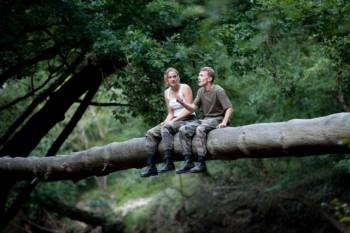
Thomas Cailley's Love at First Fight
In the Courtyard / Dans la cour
Pierre Salvadori, France, 2014, DCP, 97m
French with English subtitles
National treasure Catherine Deneuve sinks her teeth into the role of Mathilde, a former social worker inhabiting an upscale apartment with her husband Serge (Féodor Atkine). When slovenly musician Antoine (Gustave Kervern) applies by chance for a caretaker job in their building, Mathilde insists Serge hire him, despite his rough manners and lack of qualifications. An unlikely friendship develops between the depressed custodian and the elegant retiree, whose dependence on Antoine increases as her grasp on reality begins to slip. Best known for light comedies like Après Vous, director Pierre Salvadori handles the shifts in tone adroitly, abetted by nuanced turns from Kervern (himself a director) and the always masterful Deneuve. A Cohen Media Group release. North American Premiere. [23 April 2014 French release, AlloCiné press rating 3.8.]
In the Name of My Daughter / L’Homme qu’on aimait trop
André Téchiné, France, 2014, DCP, 116m
French with English subtitles
André Téchiné, whose previous film Unforgivable was a Rendez-Vous 2012 selection, returns with another penetrating psychological drama. In 1976 Nice, young divorcee Agnès Le Roux (Adèle Haenel) falls for shady lawyer Maurice Agnelet (Tell No One director Guillaume Canet), allowing him to manipulate her into handing the casino run by her mother, Renée (Catherine Deneuve), over to the mob. The subsequent disappearance of Agnès and Maurice’s emigration to Panama with her money convinces Renée that he has murdered her, and so she swears to see justice served. Téchiné’s atmospheric recounting of the real-life Affaire Le Roux features a regal turn from Deneuve and further evidence of Haenel’s immense versatility and remarkable talent. A Cohen Media Group release. North American Premiere. [French release 16 July 2014, AlloCiné 3.1. Unforgivable's rating was 2.6.]
Love at First Fight / Les Combattants
Thomas Cailley, 2014, France, DCP, 98m
French with English subtitles
A triple winner at last year’s Cannes, where it played in the Directors’ Fortnight, Love at First Fight offers a warm and refreshing coming-of-age story. Easygoing and naïve Arnaud (Kévin Azaïs) plans to spend the summer helping his brother in the family carpentry business. But when he meets Madeleine (Adèle Haenel), a steely young woman determined on the harshest military service and preoccupied with visions of the apocalypse, he adoringly follows her to boot camp. Thomas Cailley’s first feature may feel unmistakably familiar, yet it offers two alluring and empathetic protagonists (portrayed by equally likable actors), well-wrought humor, and gorgeous cinematography by David Cailley (the director’s brother). A Strand Releasing release. [AlloCiné press rating 4.1.]
May Allah Bless France! / Qu’Allah bénisse la France!
Abd Al Malik, France, 2014, DCP, 95m
French with English subtitles
Celebrated rapper and spoken word artist Abd Al Malik makes his directorial debut with May Allah Bless France!, a candid account of his early life and artistic awakening that earned him the FIPRESCI Discovery Prize at the 2014 Toronto International Film Festival. Born Régis Fayette-Mikano to Congolese immigrants, he grew up in Strasbourg’s housing projects, participating in petty crimes that cost the lives of his friends. He found release in writing and performance, converting to Sufism at age 24 and penning the memoir that informed this adaptation. Marc Zinga ably inhabits the role of young Régis, movingly limning his journey to redemption. Shot in black and white, the film visually and thematically recalls Mathieu Kassovitz’s seminal urban crime drama La Haine. [French release 10 December 2014, AlloCiné press rating 3.3.]
Métamorphoses
Christophe Honoré, France, 2014, DCP, 102m
French with English subtitles
Perhaps the most ambitious undertaking in this year’s Rendez-Vous, Métamorphoses brings to the screen reimagined tales from Ovid’s magnum opus. The narrative poem, which interweaves mythology with a history of Roman civilization, is transplanted to present-day France, where Jupiter (Sébastien Hirel) absconds with schoolgirl Europa (newcomer Amira Akili). Nestled within their courtship are interludes with Narcissus, Orpheus, and Bacchus, and humans repeatedly changed into animals. Stylist Christophe Honoré (director of the musical melodrama Love Songs, a Rendez-Vous 2008 selection) renders scenes of breathtaking natural beauty and, as befits the gods’ dalliances with mortals, near-constant eroticism. A cinematic experience like no other. North American Premiere. [AlloCiné press rating 3.2.]
My Friend Victoria / Mon amie Victoria
Jean-Paul Civeyrac, France, 2014, DCP, 95m
French with English subtitles
Based on the story "Victoria and the Staveneys" by Nobel laureate (and oft-filmed author) Doris Lessing, My Friend Victoria relocates its black London heroine to contemporary Paris while retaining her essential, puppet-like passivity. As an 8-year-old orphan, Victoria (Keylia Achie Beguie) is taken into the home of a white bourgeois family for a single night, fueling her dreams of comfort and privilege for the rest of her life. As an adult (now beautifully played by Guslagie Malanda), she reconnects with the youngest son of her host family, bearing his child after a brief affair. All the while she drifts from job to job, independent yet lacking focus—except for that one night from her childhood and its revelations. Director Jean-Paul Civeyrac [Through the Forest, NYFF 2005]manages a treatise on race and class that’s subtle, moving, and refreshingly non-didactic, refusing to reduce the characters to symbols or dilute the richness of Lessing’s prose. North American Premiere. [French release 31 December 2014, AlloCiné press rating 3.4.]
Next Time I’ll Aim for the Heart / La Prochaine fois je viserai le coeur
Cédric Anger, France, 2014, DCP, 111m
French with English subtitles
Cédric Anger, once a critic for Cahiers du Cinéma, wrote and directed this chilling chronicle of notorious serial killer Alain Lamare (here renamed Franck Neuhart and played by Guillaume Canet). In a truly mordant twist, while Lamare was terrorizing France in the winter of 1978-79, he was also an outstanding gendarme tasked with apprehending the killer. His victims were all helpless young women, whom he stalked and shot while trying to start a love affair with his pretty cleaning lady (Ana Girardot). Anger follows in the footsteps of Friedkin and Fincher in divesting all glamour from crime, instead showing the dead ends that vex the crime fighters and the dark souls that plague the criminals. The evocative period soundtrack includes Johnny Thunders and The Velvet Underground. [French release 12 November 2014, AlloCiné press rating 3.7.]
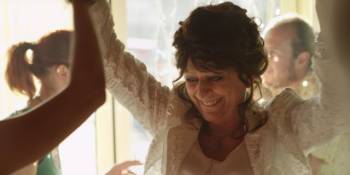
Marie Amachoukeli-Barsacq, Claire Burger and Samuel Theis's Party Girl
Party Girl
Marie Amachoukeli-Barsacq, Claire Burger & Samuel Theis, France, 2014, DCP, 96m
French with English subtitles
Angélique (Angélique Litzenburger) is a sixtyish eccentric hostess living in a small room above a bar in Lorraine. For decades she’s worked for drinks and tips but she clearly loves this flamboyant unconventional way of life. One night, smitten customer Michel (Joseph Bour) proposes marriage. This could be a way out of her unsustainable lifestyle—but is she suited to domesticity? Moreover, is she prepared to reunite with her four children, all from past relationships, including a 16-year-old daughter who grew up in foster care? Inspired by the sudden wedding of actress Litzenburger, mother to co-director Theis, the gritty slice-of-life Party Girl took home two awards at Cannes (including the Camera d’Or), where it was a standout in Un Certain Regard. U.S. Premiere. [French release 27 August 2014, AlloCiné press rating 3.6.]
Portrait of the Artist / Le dos rouge
Antoine Barraud, France, 2014, DCP, 127m
French with English subtitles
Renowned director Bertrand Bonello (House of Pleasures and Saint Laurent, as well as the subject of a retrospective at the Film Society this May) stars as "Bertrand," a filmmaker approaching his next project with a peculiar obsession—monstrosity. Convinced it should be the central theme of his film, he fixates on the notion of monstrous imagery, visiting museums and even hiring a mysterious art historian (played simultaneously by Jeanne Balibar and Géraldine Pailhas) to help him find the painting that best embodies the idea (considering works by Francis Bacon, Caravaggio, and others). But to his shock, the mania consuming his mind begins to manifest itself in his body as a monstrous red stain takes shape on his back. A disquieting yet fascinating (and funny!) mixture of body horror and character study, co-starring Barbet Schroeder as a physician and Joana Preiss as Bertrand’s wife Barbe. North American Premiere. [French release 22 April 2015.]
SK1 / L’Affaire SK1
Frédéric Tellier, France, 2014, DCP, 120m
French with English subtitles
The multi-year hunt, arrest, and trial of serial killer Guy Georges is the subject of director Frédéric Tellier’s suspenseful feature debut, based on Patricia Tourancheau’s harrowing work of nonfiction, Guy Georges: La Traque. Sentenced to life imprisonment in 2001 for the murder of seven women, Georges (Adama Niane) was described by psychiatrists as "a narcissistic psychopath" and nicknamed The Beast of the Bastille. With great sophistication, Tellier renders the police’s dogged (though often clumsy) pursuit of Georges in all of its shocking twists and menacing turns. Featuring frequent Dardennes collaborator Olivier Gourmet, Christa Théret (star of Rendez-Vous 2013’s Renoir), Raphaël Personnaz (star of Rendez-Vous 2014’s The French Minister), and four-time César winner Nathalie Baye. U.S. Premiere. [French release 7 January 2015, AlloCiné press rating 3.8.]

Sophie Letourneur's Gaby Baby Doll
Stubborn / Une histoire américaine
Armel Hostiou, France, 2015, DCP, 85m
French and English with English subtitles
Experimental filmmaker and video artist Armel Hostiou expands his 2013 short Kingston Avenue into his second feature film (after 2011’s Day), a story about the steps we’ll take and the lies we tell ourselves in the name of love. Artist Barbara (Kate Moran) tires of her (very) brief relationship with Vincent (Vincent Macaigne) and leaves him behind in Paris. But the resolute Vincent follows her to America, determined to win back her affections. Shot in New York in wintertime and featuring daytime soap veteran Murray Bartlett as Barbara’s new love interest, Stubborn, like its hero, is unabashedly romantic, utterly captivating, and often uncomfortably hilarious. North American Premiere. [French release 11 February 2015.]
Wild Life / Vie sauvage
Cédric Kahn, Belgium/France, 2014, DCP, 102m
French with English subtitles
Carole and Philippe (Céline Sallette and Mathieu Kassovitz), tired of propriety and consumerism, opt to renounce civilization and live off the land. Calling themselves Nora and Paco, they lead a nomadic life in their caravan, gradually adding children to the mix. But when Nora tires of their itinerant lifestyle and gains custody of their sons, Philippe refuses to allow his progeny to be raised according to the societal codes he abhors. What follows is the riveting true story (based on the case of Xavier Fortin) of a father’s reckless but all-consuming love, directed by Cédric Kahn, whose underrated thriller Red Lights also portrayed a husband driven to extremes. Kassovitz gives the performance of his career while Sallette is extraordinary as the desperate mother fighting to reunite with her sons. The film received a special jury prize at the San Sebastian International Film Festival. [French release 29 octobre 2014, AlloCiné press rating 3.9.]
Young Tiger / Bébé tigre
Cyprien Vial, France, 2014, DCP, 87m
French with English subtitles
Young Tiger marks the inaugural feature of Cyprien Vial, having written and directed four short subjects (including Cannes prizewinner In Range). Here he relates the experiences of eager and touching Punjabi teenager Many (Harmandeep Palminder), in France to pursue his education, torn between his desire to establish a life in his new country and the pressure to send money back home. Skipping school and forced to take illegal and dangerous jobs that pay him under the table, he finds himself on a slippery slope into criminal activity, while deceiving his girlfriend, Elisabeth (Elisabeth Lando), and his foster family. Basing his film on first- and secondhand experiences, Vial tells a story both particular to the Indian diaspora and universal to the plight of immigrants being pulled in all directions. [French release 14 January 2015, AlloCiné press rating 3.8.]
Shorts Program
Brevity is the soul of wit, and our four acclaimed shorts, all directed by talented and up-and-coming female directors, have wit and soul in abundance. Whether testing grounds for tomorrow’s feature filmmakers or stylistic departures for today’s top directors, our richly textured shorts prove that dimension is in no way tied to duration.
The Smallest Apartment in Paris / Le Plus petit appartement de Paris
Hélèna Villovitch, France, 2014, 15m
French with English subtitles
Carla and François are forced to share a 16 square meter studio in this whimsical sketch addressing the housing crisis that all urban dwellers are sure to identify with. North American Premiere.
Back Alley / Le Contre-allée
Cécile Ducrocq, France, 2014, DCP, 29m
French with English subtitles
A streetwalker since the age of 15, Suzanne finds her livelihood threatened by the arrival of African prostitutes on her turf in this heartbreaking winner of the Small Golden Rail prize at Cannes.
The Space / Espace
Eléonor Gilbert, France, 2014, 14m
French with English subtitles
A young girl wants to play soccer at recess but schoolyard sexism prevents it. So, with pencil and paper, she charts her grievances, urging her peers to take back the playground. U.S. Premiere.
Extrasystole
Alice Douard, France, 2013, 35m
French with English subtitles
When student Raphaëlle, subject to cardiac contractions, meets enigmatic teacher Adèle, it’s not just her condition that makes her heart skip a beat.
Last edited by Chris Knipp; 03-07-2020 at 09:15 AM.
-
Benoît Jacquot: 3 HEARTS (2014)
BENOÎT JACQUOT: 3 HEARTS/3 COEURS (2014)
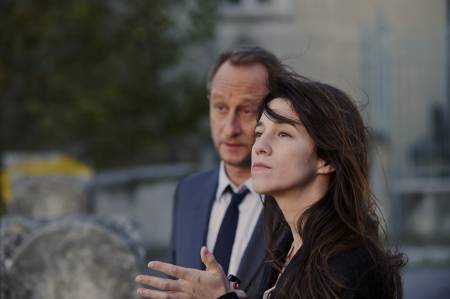
BENOÎT POELVOORDE AND CHARLOTTE GAINSBOURG IN 3 HEARTS
Tragedy of errors
Benoît Jacquot's new romantic tragicomedy hinges on several implausibilities and would be nothing if it were not for its casting of Catherine Deneuve and Chiara Mastroianni in their actual relationship as mother and daughter again (as they have been by Christophe Honoré) with the addition of Charlotte Gainsbourg as the sister and inseparable friend: three French celebrity icons. To this rock-solid triumvirate (or as Peter Debruge of Variety puts it "film-royalty trifecta") is added the able (but not too physically prepossessing) Belgian-born film actor Benoît Poelvoorde, as a Paris-based government tax accountant and the hapless lover of both sisters with a heart condition. From his point of view (up to a point) the story is seen and told. It's not really about him, even though the story hinges on his experiences. It's about those beautiful, aging, soulful, sad, cigarette-smoking, wine-sipping ladies. Without them, no movie.
Marc Beaulieu (Poelvoorde) rushes late at night into the train station of the southeastern provincial French town of Valence, stressed out. He has missed his train back to Paris. While he sips a mineral water at the still-open station bar, in walks Sylvie Berger (Gainsbourg). She looks sad, troubled; buys a pack of cigarettes. And by the way, this movie would not exist without cigarettes either. Everyone smokes them -- except Gabriel (Thomas Doret, the Kid of The Kid with the Bike), who works in the ladies' family antique shop.
Sylvie leaves the bar, but Marc rushes out after her. She's a local, and helps him look for a hotel. But they'd really both rather walk around all night. What follows is a replay of Linklater's Before Midnight, except that the whole evening is covered in only a few minutes and there's very little conversation. And yet we are to assume that these two, though Sylvie has a husband, are now madly in love. But Marc has lost his cell phone, and they don't even exchange last names. They just agree to meet in a week at the Luxembourg Gardens fountain. And this doesn't happen, because Marc has a heart attack. But it only delays him. He gets there. Only Sylvie doesn't wait very long, and so they don't meet.
If this is implausible, what follows is more so: after Sylvie, desolate at the failed connection with Marc, chooses to go to Minneapolis with her husband, Christophe (Patrick Mille), even though she had been at the point of leaving him. And by chance, Sophie (Mastroianni) wanders into the government tax offices and Marc helps her with her worries about the accounts of the antique shop, and they immediately fall in love, and subsequently marry, with Marc moving to Valence. Sophie is already in a fragile state when she meets Marc because of the departure of Sylvie. The two sisters have always been companions and best friends. Now they are reduced to Valence-Minneapolis Skype conversations.
Bruno Coulais' score is as essential as the "film-royalty trifecta," our suspension of disbelief, and cigarettes, because it often makes use of what Debruge calls "that ominous foghorn sound so popular since Inception." Our expectation that Marc will eventually discover he has married his true love's sister -- an event delayed as long as possible -- with Coulais' help, fills us with a feeling of dread combined with suspense, stress, and doom (if you can combine all these in one feeling). And it's compounded with a very real fear that Marc will have a heart attack. He is a workaholic, and continually stressed, continually late. Hence the heart attack on the way to the Tuileries Garden meeting, no accident. After the attack, the doctor tells him to stop smoking and drinking and avoid stress: but he does not do any of those things. And our sense of dread (and the rest) is compounded by the hangdog looks of Chiara and Charlotte.
Deneuve's presence is essential, but also largely ceremonial. She does little but urge people to have a piece of cake (even when rushing off to catch a plane), or to wonder why anyone would think they were smoking too much. But her beautiful, iconic face is always there, at family meals, at the wedding reception. A minor theme is Marc's decision to pursue an investigation of the mayor of Valence's tax irregularities, despite the mayor's indignation and the Berger family's friendly relations with him. This sub-thread may seem tacked on; but it helps to augment the tension that surrounds the character of Marc, who begins to seem hell-bent on trouble in more than one way.
In the end, because of its actors being good as well as iconic, because the settings are beautiful and the direction, cinematography, and editing are elegant, one realizes this isn't just a depressive rom-com but a meditation on chance and romance, missed opportunities and hasty decisions. To refer to Peter Debruge again, he suggests that even if Jacquot wasn't thinking of it, this film particularly illustrates his preoccupation with basic themes of the romantic values of Marguerite Duras, with whom he worked at the outset of his career forty years ago, "love at first sight, spontaneous tears, all-consuming desire and impossible, self-destructive decisions." With the sketched-in prelude and the implausible (and tragicomic) coincidence as its necessary linchpins, 3 Hearts is a poem to ponder filled with such sweet sadness. This is a movie mélo that's a lot more tense and anxiety-inducing than any ordinary rom-com.
3 Hearts/3 Cœurs, 106 mins., debuted at Venice; also at Toronto and a dozen other international festivals. French theatrical release 3 September 2014, when it was well received (AlloCiné press rating 3.6). A Cohen Media Group release, it opens theatrically in NYC 13 March 2015 (at Lincoln Plaza) followed by a national roll-out. Screened for this review as part of the Film Society of Lincoln Center-UniFrance joint series Rendez-Vous with French Cinema, where it will be the opening night film 6 March, its US debut.
(Coming from Benoît Jacquot in April 2015: a new version of Gustave Mirabeau's Diary of a Chambermaid, with Léa Seydoux and Vincent Lindon.)
Last edited by Chris Knipp; 02-21-2015 at 05:57 PM.
-
Jean-Charles Hue: EAT YOUR BONES (2014)
JEAN CHARLES HUE: EAT YOUR BONES/MANGE TES MORTS (2014)
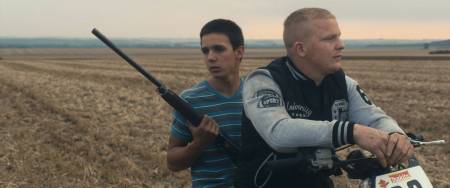
JASON FRANÇOIS AND MOISE DORKEL IN EAT YOUR BONES
Tragicomic Gypsy noir thriller, enacted by themselves
Following up on his documentary/fiction hybrid debut, The Lord’s Ride/La BM du Seigneur, which portrayed the gypsy communities of northern France, director Jean-Charles Hue reunites some of that film’s nonprofessional acors to tell the story of another Romani family, by reports closely related to their own lives. It's the day before the eighteen-year-old Jason (Jason François) is to be baptized, and some in the tribe, including his mother, are ardent born-again Christians. But the day takes a huge detour. Jason's half-brother Fred (Frédéric Dorkel) arrives, just released after 15 years in prison for killing a cop. Riding in Fred's lovingly preserved BMW, the two, along with a third brother and a cousin, team up to steal a truckload of copper, but things go dramatically wrong in what turns out to be very much a short gangster film, only with more of a do-it-yourself flavor, actors from the milieu of the story recreating real events of Fred's life. Though the film image quality was disappointing, eventually in the night scenes the images turn out to be poetic and beautiful. No wonder Hue, who received a number of nominations for his first film, was awarded the 2014 Prix Jean Vigo, a prize reserved for a French director whose work shows a "spirit of independence and extraordinary style." A remarkable piece, something of a curiosity, a movie that enables real people who live partly cinematic lives to comment on those lives through enacting fiction. At the same time it's clearly filmmaker Jean-Charles Hue's homage to a people and a world whose romantic and heroically doomed existence he sees beyond their trailer-trash Harmony Korine facade.
Reviewing the film at Cannes for Hollywood Reporter, Jordan Meltzer observes the cast, whom he calls "the slang-spouting trailer park gypsies of Northern France," partly through an American lens, noting that their "love of beer, barbecue, crime and God are about the closest thing Europe may have to the gun crazy communities of America's Deep South." He also notes their similarity to the characters of Bruno Dumont's The Life of Jesus. Meltzer is also right in noting the film "meanders too much" in its documentary-style prelude by the trailers and the barbecue, and only really hits its stride when Fred roars off in his car with his compadres and night falls. This is when dp Jonathan Ricquebourg shows both his aesthetic and action chops, for shootouts and car chase that as Meltzer puts it have "the fury and energy of the early Mad Max movies." It goes without sayint ghat these gypsies and the Dorkel family in particular, whose partly Eastern European origins explain why some of them are blond, are natural thespian types, having no trouble at all ramping up their everyday behavior into something that fits a combination gangster and Western plot.
Eat Your Bones/Mange tes morts-Tu ne diras point, 94 mins., debuted at Cannes Director's Fortnight. French theatrical release 17 September 2014 led to excellent reviews (AlloCiné press rating 4.0). Here this niche film even in its native France is more of a curiosity, and it is currently marred by very odd English subtitles in which certain consonants are consistently missing. Screened for this review as part of the March 2015 Film Society of Lincoln Center/UniFrance joint series Rendez-Vous with French Cinema.
Last edited by Chris Knipp; 03-10-2015 at 07:00 AM.
-
Mélanie Laurent: BREATHE (2014)
MÉLANIE LAURENT: BREATHE/RESPIRE (2014)
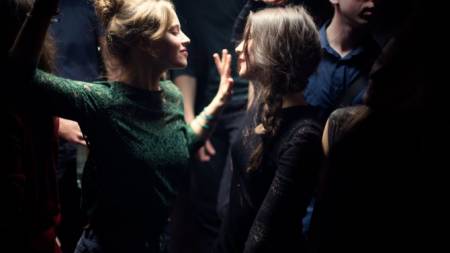
LOU DE LAÂGE AND JOSÉPHINE JAPY IN BREATHE
Poison girlfriends
The beautiful French actress Mélanie Laurent (Inglourious Basterds), who is now 32, debuted as a director with the 2011 The Adopted/Les adoptés, where the steadfast triumvirate of a mother and two daughters is rocked after one sibling begins a relationship with a man. Her sophomore effort leaves men out almost completely, focusing on two mothers and (primarily) on their two daughters, the latter in a decidedly dysfunctional relatinship, cruel on one side, unhealthily obsessive on the other, which can only end badly -- as it turns out, very badly. I could only miss the subtlety and delicate moderation of Céline Sciamma's debut feature Water Lilies, also about girlish obsession, exploitation and dependency, but far more within the realm of the usual and the plausible. Having just watched Jacquot's 3 Hearts, which uses Catherine Deneuve, her daughter Chiara Mastroianni, and Charlotte Gainsbourg as an iconic triumvirate, I was struck by how well 17-year-old Charlie (Joséphine Japy, Gray Souls, R-V 2005) fits into the tradition. Japy has Charlotte Gainsbourg's fashionably disordered hair and a sad little face that could be that of Chiara Mastroianni as a girl. And these teenage girls still brandish long cigarettes the same way Charlotte, Chiara, and Catherine do.
Charlie (nickname for the derided given name of Charlene) is an exploited victim who occasionally lashes out. She is shy, serious, and saddened by the breakup of her parents. Her father is only glimpsed; her mother, seen occasionally, is played by César winner Isabelle Carré (The Refuge, R-V 2010). The vivacious villain of the piece is Charlie's new friend Sarah (Lou de Laâge of Jappeloup, R-V 2013), a new arrival at her lycée, where for both of them their key final year "bac" diploma exam eventually looms, but emotional game-playing frequently seems to make study barely relevant. Besotted by Sarah's charm and confidence, eager for distraction from her fighting parents, Charlie ignores warning signs.
Sarah tells Charlie her mother is away for six months working for an NGO in Africa, which makes her appear both needy and glamorous. Sarah is vivacious and social and may bring out the shy Charlie. But in the social whirl of a summer vacation with other students in Spain, Charlie grows jealous and suspects her intimacy with Sarah may be fake. Sarah is everybody's friend and nobody's, and doesn't respect the privacy of the secrets Charlie has shared with her. Charlie is too needy and timid to find friendship elsewhere -- but not too inhibited to retaliate.
In his Cannes Variety review Scott Foundas suggests this film achieves the "small but impressive triumph" of making us "feel complicity in Sarah's claustrophobic codependency" so that when Sarah is away from Charlie, we "long for her return, despite knowing that's probably not the best idea." That's the understatement of the year. Sarah is utter poison for Charlie. One might have appreciated a fuller look at the motives and mechanisms of the two girls' behavior. There could have been more about the causes of Sarah's cruel and deceptive behavior and more motivation for Charlie's willingness to submit to it. Breathe provides intense emotional portraits, but some elements seemed tacked on or flimsy. "Breathing" is a theme relevant to both Charlie and Sarah, but it hardly seems integral to the film. One wonders both why no other students develop personalities and why there are no boys to enter the two girl's world; alternately, why such a handsome boy suddenly offers himself to the drab Charlie at the end.
My subtitle is an allusion to Emmanuel Bourdieu's 2006 film Poison Friends/Les amitiés maléfiques (NYFF 2006), about a group of literature students at the Sorbonne duped into accepting as a mentor a cruel, exploitive fellow student who's a complete fake. Lacking the subtlety of Céline Sciamma's tale or the full cast of characters and interesting plot line of Emmanuel Bourdieu's, Laurent's film, adapted by Laurent with Julien Lambroschini from a novel by Anne-Sophie Brasme, is marked by an awkward alternation between periods of Young-Adult-novel blandness and noir extremism. Nonetheless the two young actresses, under Laurent's direction, show promise, and the widescreen cinematography of Arnaud Potier is consistently handsome.
Breathe / Respire, 91 mins. debuted at Cannes (Critics’ Week — Special Screenings) 17 May 2014; has shown in over a dozen other festivals including Toronto. French theatrical release 12 November 2014, with good reviews (AlloCiné press rating 3.5). Screened for this review as part of the Film Society of Lincoln Center-UniFrance series Rendez-Vous with French Cinema, March 2015.
Last edited by Chris Knipp; 02-20-2015 at 06:41 AM.
-
Jean-Paul Civeyrac: MY FRIEND VICTORIA (2014)
JEAN-PAUL CIVEYRAC: MY FRIEND VICTORIA/MON AMIE VICTORIA (2014)

GUSLAGLIE MALANDA AND PIERRE ANDRAU IN MY FRIEND VICORIA
Cloying generosity
In My Friend Victoria Jean-Paul Civeyrac, who is on the faculty of the elite Paris cinema institute La Fémis, has produced a glossy, sweet, gentle adaptation of "Victoria and the Staveneys," a story by Doris Lessing about race, class, and privilege that focuses on the relationship that develops by chance between poor black girl and a well-off liberal-left white family, transposing everything from London to Paris. The eight-year-old black girl, Victoria, has no one to pick her up from her local school one afternoon when her aunt falls ill and is taken to the hospital, and Edouard of the Staveney family (now called Sauvinet), takes her home for the night. This brief experience is an awakening for the girl to luxury and comfort that stays with her; later she is astonished to learn the Sauvinets' roomy apartment is near her aunt's little one. Victoria remains as in the story "a construct rather than a character" (as a Guardian review put it) but the white family doesn't seem so clearly "skewered" as by Lessing. It's true, the mother still says she "always wanted a black child," and her husband (played by the always slightly odd Pascal Greggory) uses politically incorrect pet names, and their younger son Thomas fetishizes black women. Somehow it all seems rather adorable. A constant voice-over by Victoria's best friend adds a cozy Nouvelle Vague note. The story is beautifully told by Civerac; it's just lost some of its bite and gains French gloss.
Knowing where the Sauvinet family lives, Victoria (played as an adult by Guslagie Malanga) keeps an eye on their building and sees the younger brother Thomas (who always wanted to kiss her at school) grow up. She lacks motivation, drops out of lycée and takes a succession of jobs. It's her adopted sister and best friend Fanny (Nadia Moussa), the narrator, who goes on to study literature at the Sorbonne and wants to become a writer. When Thomas (Pierre Andrau) turns up at the record shop where Victoria has found a home, she tells him who she is, he asks her out and they become lovers. It's not a profound love but after they've drifted apart by mutual agreement when he goes off to college in the US, she discovers she is pregnant with his child, whom she chooses to have, and calls Marie. Later she has a black husband, Sam (Tony Harrisson), and they have a little boy, Charlie (Khadim Ka). Sam, a musician, whom she loves, is always away and dies in a car crash.
It isn't until seven years after Marie's birth that Victoria decides to tell Thomas he has a daughter. Not only is Thomas delighted with this news, and adoring of Marie, assuming his responsibilities as her father, but his whole family rallies round embracing both Victoria and Marie now as members of the family. Only Edouard, who's become an international big shot, is suspicious and insists on paternity being proven. But eventually he too accepts (paternity indeed being proven) and apologizes for his initial behavior. The heart of the film/story is the way the Sauvinets' means and their embrace of Marie (while ignoring Charlie) make Victoria feel her control kindly but inexorably usurped, swept away by the power of wealth, privilege and race. A crux is the old school in the neighborhood where Thomas and Edouard, then students there too, first met Victoria, and where Marie now goes. The school is a tougher choice for well-off liberals now, with weapons and drugs added, and the Sauvinets want to send Marie to a "good" school. Victoria agrees but rejects a boarding school, though knowing a boarding school is in the future.
One may feel sometimes that the Sauvinets have taken over not only Marie, but the film itself; but one has to recognize that despite Victoria's impoverished origins, she is a French native, not an immigrant with a grim past. Even if it may feel too glossy and too gentle in its depiction of the Sauvinets, its educated black woman's polished narration too lulling, My Friend Victoria is still subtly provocative. Civeyrac's well-written and edited film, coming from a somewhat schematic short story, is lightweight at its core, but richly textured and pleasing in its surfaces. It's certainly far different from his symbolic, fable-like work, exemplified by his first feature Through the Forest (NYFF 2005); evidently similar in its more realistic approach to his second feature, Young Girls in Black (2010), a film about teen angst.
My Friend Victora/Mon amie Victoria, 95 mins, debuted at Namur and showed at the London Film Festival. French theatrical release 31 December 2014 (AlloCiné press rating 3.4). Screened for this review as part of the Film Society of Lincoln Center-UniFrance joint series Rendez-Vous with French Cinema in March 2015 (North American premiere). US theatrical release 4 Dec. 2015 (NYC, IFC Center).
Last edited by Chris Knipp; 11-30-2015 at 06:05 PM.
-
Cédric Kahn: WILD LIFE (2014)
CÉDRIC KAHN: WILD LIFE/VIE SAUVAGE (2014)
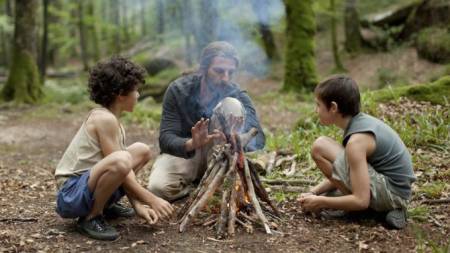
Not so wild
This film, featuring one of director and actor Matthieu Kassovitz's more extensive roles in recent years, is a free adaption of the real-life story of Xavier Fortin, who became an outlaw for over a decade hiding with his two sons when his wife broke with their back-to-nature lifestyle and won a custody battle for the boys, and he refused to comply. I refer the reader to my review of another French film dealing with the same material, Jean Denizot's The Good Life/La belle vie (FCN 2014; released in France April 2014).
The French critics seem to prefer the Cédric Kahn film. Neither is an exact depiction of the events, which may be in dispute since the wife's account and the husband's differ. I think Denizot's film makes more sense, and shows more of the positive side of the boys' life in nature with their father. Both films use two sets of actors for the sons, for when they are seven and eight and when they are teenagers.
In Cédric Kahn's film, Carole (Céline Sallette and Mathieu Kassovitz) bonded because both had tired of propriety and consumerism and renounced civilization and chosen to live off the land. Calling themselves Nora and Paco, they have led a semi-nomadic life in a caravan, eventually having three sons. But Nora has tired of their itinerant lifestyle and wanting to give her their sons a conventional education and more of an opportunity to function in the world, she gains custody. But when Philippe comes to Nora/Céline's parents' house, the two younger boys escape and run off with their father, the oldest remaining behind.
The two younger boys are seven and eight when this happens, and the father takes them on the run, hiding from police, trying to continue living in nature and home-schooling the boys. This goes on for over a decade, whereupon both the boys begin to get fed up with the limitations of their life, and the father gets caught.
In Denizot's film, the boys and their father are largely on their own, and the positive side of the experience comes through better. In Kahn's film, there are a lot of times when the trio are living with hippies or punks, on the edge of a farm, and some chaos and conflict ensue. In Denizot's film, a change comes when the older boy meets a girl and falls in love with her, and finds a job, and leaves to be with her. The fugitive life has prevented him from experiencing sex, and he wants to have his own car and funds. In both films, conflicts eventually arise between the boys and their father.
Kahn takes us to the period when the father is arrested and the boys, seeking to gain his release, are confronted by their mother, who hasn't seen them for all these years. Even more than in her role of Jean Dujardin's spouse in The Connection, Céline Sallette plays a borderline hysterical, shrill wife. Her emotionality may be effective, but it's grating.
In my review of Denizot's film, I mention Sidney Lumet's moving 1988 film Running on Empty, featuring River Phoenix, which does not have spouses in conflict, but is also about a family on the run from authorities, moving from place to place and concealing their identity, and also involves an older son who reluctantly has to choose, in the interests of personal fulfillment, to break away from his fugitive family. The Running on Empty family are living in suburbs and cities, so living in nature isn't involved. But Running on Empty works better than these two French films, perhaps for the latter reason. It seems difficult to represent both the appeal of living in nature away from civilization while simultaneously showing a fugitive existence. The two work against each other. It becomes too complicated. In the case of Kahn's film, the action simply becomes too chaotic. In the focus on authentic milieux, one loses contact with where they are and what is gong on.
Nonetheless, Cédric Kahn's Wild Life has been perhaps the best critically received of all his films, and it won a special jury prize at the San Sebastian International Film Festival. Certainly this theme is a fascinating one.
Wild Life/Vie sauvage, 102 mins., after its San Sebastian debut, showed at a handful of other festivals and had its French theatrical relase 29 October 2014 (AlloCiné press rating 3.9.). The 2010 Rendez-Vous featured Cédric Kahn's Regrets. The director's 2004 adaptation of Georges Simenon's tense short novel Red Lights/Feux rouges is also worth watching. Shown as part of the FSLC/uniFrance-sponsored Rendez-Vous with French Cinema at the Walter Reade Theater and the IFC Center in New York in March 2015, its North American premiere, where it was screened for this review.
Last edited by Chris Knipp; 02-21-2015 at 09:29 PM.
 Posting Permissions
Posting Permissions
- You may not post new threads
- You may not post replies
- You may not post attachments
- You may not edit your posts
-
Forum Rules











 Reply With Quote
Reply With Quote





Bookmarks